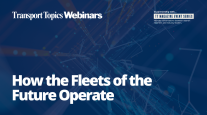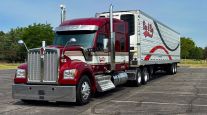Managing Editor, Features and Multimedia
Embracing the Possibilities: Trucking’s AI Transformation

[Find the latest in trucking technology: Explore this quarter's issue of iTECH]
The rise of artificial intelligence promises to change the way people work and how companies manage their businesses in all sorts of industries, and freight transportation is no exception.
This transformation is not something that will arrive in the distant future, but a process that is already underway as technology developers begin to unlock the potential of AI and businesses start using it to solve various challenges.
In general, the latest wave of AI development will make it increasingly possible for trucking and logistics companies to convert massive amounts of often unstructured data into actionable business intelligence, automate mundane yet time-consuming tasks and ultimately realize higher levels of safety, productivity and customer service.
Transportation businesses and their technology vendors are targeting a wide range of applications for AI. These include optimizing truck routing and dispatching, enabling predictive freight pricing and more intelligent bidding, using generative AI and virtual assistants to boost the efficiency of office workers, detecting unsafe driving and enhancing driver coaching, boosting driver retention and optimizing vehicle maintenance.
More Q2 iTECH

► A New Wave of AI Is Coming
►Clevenger: Trucking's AI Transformation
►TIA: Tech Vendors Introduce Latest Offerings
►Dysart: Promoting Your Fleet Online With Testimonial Videos
Explore the Issue!
But this is only the beginning. In the future, innovators will surely find new ways to harness AI that we haven’t yet envisioned.
That’s why, in this issue of iTECH, we surveyed a broad spectrum of technology developers to gain a better understanding of AI’s potential in freight transportation.
While the potential use cases are virtually endless, a common theme is that AI is poised to become a key enabler for transportation businesses in their constant pursuit of improvement.
As companies work to enhance road safety, boost customer service, reduce carbon emissions, provide their employees with more fulfilling careers and improve profitability in an often volatile market, AI will play a part in realizing all these goals.
Over time, expect the use of AI to become ingrained in standard business management practices.

Clevenger
Today and in the near term, AI can be a competitive advantage for carriers and 3PLs that figure out ways to utilize it effectively in their operations.
But at some point in the future — perhaps the not so distant future — leveraging AI to automate routine tasks and generate business intelligence may very well become a requirement to remain competitive in the transportation industry.
Now is the time for business leaders in trucking and logistics to begin exploring the possibilities.
Want more news? Listen to today's daily briefing below or go here for more info:




